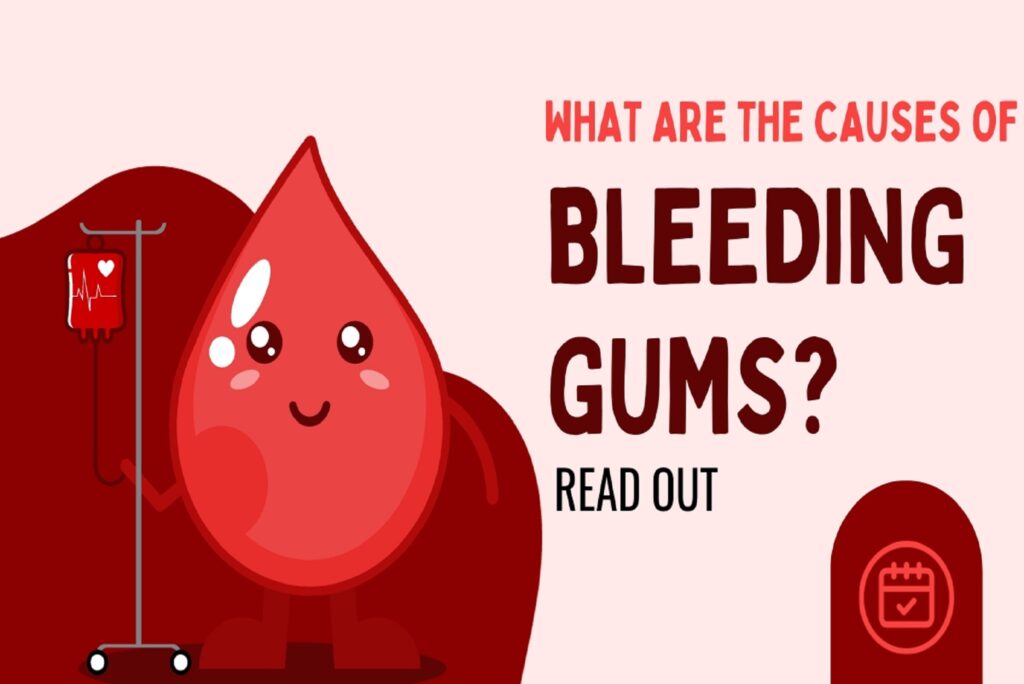Let Us Know from Our Dentist in Bilaspur: What Are the Reasons for Bleeding Gums?
Karmanya DewanganNovember 6, 2023
What Are the Reasons for Bleeding Gums can be a common and concerning issue for many people.
While it’s easy to dismiss occasional gum bleeding as a minor inconvenience, it can sometimes be a sign of underlying oral health problems.
To help shed light on this issue, we turn to our trusted dentist in Bilaspur, who will share insights on the various reasons for bleeding gums and the importance of addressing this issue promptly.
Let’s delve into the details- What Are the Reasons for Bleeding Gums
1. Poor Oral Hygiene
One of the most common causes of bleeding gums is poor oral hygiene. When you don’t brush and floss your teeth regularly, plaque and tartar can accumulate on your teeth and gums.
This buildup can lead to gingivitis, which is the earliest stage of gum disease. Gingivitis often presents with red, swollen, and bleeding gums.
Maintaining a proper oral hygiene routine is essential to prevent and address this issue.
Our dentist in Bilaspur recommends brushing your teeth at least twice a day, using a soft-bristle toothbrush and fluoride toothpaste.
In addition, flossing daily helps remove food particles and plaque from between your teeth, reducing the risk of gum bleeding.
2. Gingivitis and Periodontitis
Gingivitis, as mentioned earlier, is the initial stage of gum disease. If left untreated, it can progress to a more severe condition known as periodontitis.
In periodontitis, the inflammation extends deeper into the supporting structures of the teeth, including the bone.
Symptoms of periodontitis can include persistent gum bleeding, gum recession, and even tooth mobility.
Regular dental check-ups are crucial to monitor and manage gum disease.
Our dentist in Bilaspur emphasizes the importance of early intervention to prevent the progression of gingivitis into periodontitis, which can lead to tooth loss if not properly addressed.
3. Medications
Some medications can lead to bleeding gums as a side effect. Certain anticoagulants, antihypertensive drugs, and even over-the-counter pain relievers like aspirin can thin the blood, making gum tissues more prone to bleeding.
If you suspect that your medication is causing your gums to bleed, consult your dentist in Bilaspur and your prescribing physician.
They can help you determine if any adjustments to your medication are necessary.
4. Hormonal Changes
Hormonal changes, such as those that occur during pregnancy, menstruation, or menopause, can affect gum health.
Some women may experience gum bleeding or increased gum sensitivity during these times due to hormonal fluctuations.
This condition is known as “pregnancy gingivitis” and is often temporary.
Maintaining a thorough oral hygiene routine and informing your dentist in Bilaspur about hormonal changes is essential during these periods to prevent any complications and ensure healthy gums.
5. Vitamin Deficiencies
Deficiencies in essential vitamins and minerals, such as vitamin C and vitamin K, can contribute to bleeding gums.
Vitamin C is crucial for collagen production, which helps maintain the strength and integrity of your gum tissues. Vitamin K plays a role in blood clotting, helping prevent excessive bleeding.
If you suspect vitamin deficiencies are causing your gum problems, consult with your dentist in Bilaspur and consider dietary changes or supplementation to address these issues.
6. Tobacco Use
Tobacco use, whether through smoking or chewing, can harm your oral health in many ways. It increases the risk of gum disease, leading to bleeding gums, and can also cause teeth to stain and decay.
Quitting tobacco use is one of the best decisions you can make for your oral and overall health.
Our dentist in Bilaspur can provide guidance and support for those looking to quit smoking or chewing tobacco and improve their oral health.
7. Ill-Fitting Dentures or Braces
Ill-fitting dentures or braces can exert pressure on the gum tissues and teeth, causing irritation, sores, and bleeding.
If you’re experiencing gum bleeding due to your dentures or braces, consult with your dentist in Bilaspur to adjust the appliances for a more comfortable fit.
8. Diabetes and Bleeding Gums
Uncontrolled diabetes can contribute to gum disease and bleeding gums. High blood sugar levels can impair the body’s ability to fight infections, increasing the risk of gum problems.
If you have diabetes, it’s essential to manage your blood sugar levels and inform your dentist about your condition for proper oral care.
9. Stress and Oral Health
Chronic stress can weaken the immune system and contribute to various health issues, including gum disease.
Finding effective stress management techniques, such as exercise, meditation, or counseling, can positively impact your oral health and reduce the likelihood of bleeding gums.
10. Brushing Technique Matters
While brushing is crucial for oral health, the technique matters. Brushing too aggressively or using a hard-bristle toothbrush can irritate the gums and lead to bleeding.
It’s important to use a gentle brushing technique with circular motions to clean your teeth effectively without causing harm to your gums.
What Are the Reasons for Bleeding Gums: FAQ
Q1: How can I improve my oral hygiene to prevent bleeding gums?
To improve your oral hygiene, follow these steps:
- Brush your teeth at least twice a day with a soft-bristle toothbrush and fluoride toothpaste.
- Floss daily to remove plaque and food particles from between your teeth.
- Schedule regular dental check-ups for professional cleanings and early detection of any oral health issues.
Q2: Can hormonal changes really affect gum health?
Yes, hormonal changes, such as those during pregnancy, menstruation, or menopause, can affect gum health.
Pregnancy gingivitis is a common condition during pregnancy due to hormonal fluctuations. Maintain a thorough oral hygiene routine and inform your dentist about hormonal changes for proper guidance.
Q3: How can I determine if my medication is causing bleeding gums?
If you suspect your medication is causing bleeding gums, consult both your dentist in Bilaspur and prescribing physician.
They can assess whether adjustments to your medication are necessary and provide guidance on managing potential side effects.
Q4: Are there specific vitamins that can help prevent bleeding gums?
Yes, vitamin deficiencies, particularly in vitamin C and vitamin K, can contribute to bleeding gums. Consult with your dentist to discuss dietary changes or supplementation to address these deficiencies and promote gum health.
Q5: Is quitting tobacco use really effective in improving oral health?
Yes, quitting tobacco use, whether through smoking or chewing, is highly effective in improving oral health.
Tobacco use increases the risk of gum disease, leading to bleeding gums, and can also cause staining and decay.
Seek guidance and support from your dentist in Bilaspur to quit tobacco and improve your overall oral health.
Q6: How do ill-fitting dentures or braces contribute to bleeding gums?
Ill-fitting dentures or braces can exert pressure on gum tissues and teeth, leading to irritation, sores, and bleeding.
If you experience bleeding gums due to dental appliances, consult with your dentist in Bilaspur to adjust them for a more comfortable fit.
What Are the Reasons for Bleeding Gums: Conclusion
What Are the Reasons for Bleeding Gums are not to be ignored. They can signal underlying oral health issues, some of which may have implications for your overall well-being.
To maintain healthy gums and teeth, regular visits to a trusted dentist in Bilaspur are crucial.
Don’t hesitate to seek professional advice if you experience bleeding gums or any other oral health concerns. Remember that early intervention is key to preventing more serious problems down the line.
Categories: blog_post
